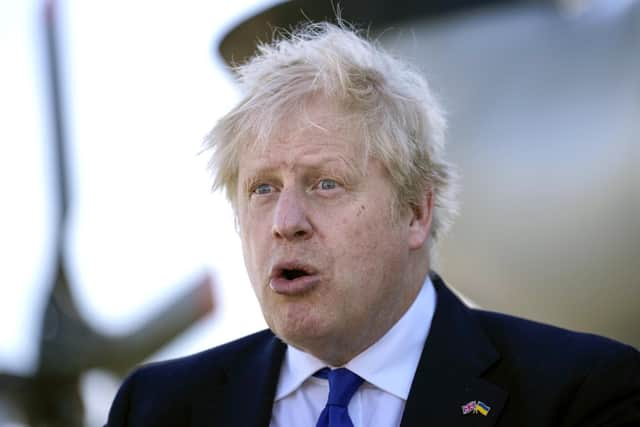Hard road ahead for Boris Johnson and his premiership - Dr Christopher Byrne
Indeed, the result wasn’t even that close, with 211 MPs sticking with him against 148 opposing him continuing as PM.
Conservative Party rules also now favour Johnson because after the failed vote it won’t be possible to call another for 12 months. Johnson may be hoping that this will be enough time for him to shift the public’s focus away from the issues that have bogged him down in recent months, so that he can lead his party into the next election.
Advertisement
Hide AdAdvertisement
Hide AdHe will no doubt be hoping to put “Partygate” in his rear view mirror and to focus on other, safer issues such as providing military aid to Ukraine or rolling out his Levelling Up agenda as the economy recovers from the pandemic.


The reality is quite different though. This was a colossal rebellion of Conservative backbenchers and one comparable to challenges that have finished off previous Conservative Prime Ministers. When you factor out the “payroll” vote of MPs bound to support the Prime Minister (current ministers, parliamentary private secretaries and so on), only around 50 additional MPs gave their support, and not all of them will have genuine confidence in the PM and instead will have been thinking about how to get onto the payroll.
Furthermore, comparing this result to past leadership contests, it was larger than the rebellion that eventually finished off Theresa May (117 Conservative MPs) and similar in size to the one that eventually deposed Margaret Thatcher (168 Conservative MPs – although in percentage terms the rebellion against Johnson was even bigger). The truth is that this leadership challenge has further damaged the Prime Minister’s already tarnished brand and, what’s more, the things that have caused his recent difficulties are unlikely to go away any time soon.
Partygate may be over in the sense that the Metropolitan Police have suggested there would be no further fines for the Prime Minister in relation to his rule-breaking during the pandemic, and now that the Sue Gray report has been published. But there is ample evidence that revelations of 10 Downing Street staff parties until 4am (on the eve of Prince Philip’s funeral, no less) and “poor treatment of security and cleaning staff” to boot has permanently altered public perceptions of the Prime Minister. Seventy-four per cent of people in a recent YouGov poll said they thought the PM did “knowingly lie” about breaking lockdown rules.
Advertisement
Hide AdAdvertisement
Hide AdWorse still, the cost-of-living crisis is only set to worsen. This is already the issue voters say is the most important one facing the country after six months of spiralling energy costs and tax rises. Prices at the pump are now at historic highs with no sign of falling back, while October looks set to bring another approximately £800 rise in domestic energy costs for the average household. These will be mitigated somewhat by the Government’s recently announced £15bn “cost of living” support package, giving the poorest households an extra £1,200 this year, but there are still deep divisions within the Conservative Party over the direction of economic policy.
Many Conservative backbenchers are unhappy that a Conservative government has increased the tax burden to its highest point since the 1940s. It was therefore to be expected that Johnson would state his intention to cut taxes when he spoke before the 1922 Committee on Monday. But it’s not clear how he can achieve this given the need to stabilise the public finances in the wake of the pandemic, and the need to finance what’s left of his Levelling Up agenda.
To make matters worse, economies across the West are now facing the likely prospect of a recession, Britain included. The Ukraine crisis also threatens to trigger”‘apocalyptic” rises in food prices, in the words of the governor of the Bank of England, Andrew Bailey.
William Hague has already compared the Prime Minister trying to carry on under these circumstances to “trying to drive along the M1 with two flat tyres”. That might downplay the peril the Prime Minister now faces given the likely return of 1970s-style stagflation produced by a flatlining economy and unstoppable price rises.
- Dr Byrne is a Senior Lecturer in Politics at Leeds Beckett University’s School of Social Sciences.
